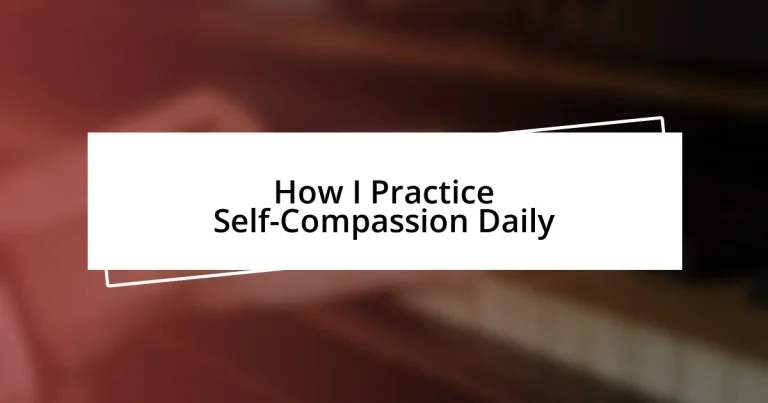Key takeaways:
- Practicing self-compassion fosters resilience and emotional health, allowing individuals to acknowledge struggles without judgment.
- Daily techniques like gratitude, mindful breathing, and journaling help cultivate a compassionate mindset and promote personal growth.
- Setting realistic expectations and boundaries is essential for nurturing self-kindness and reducing feelings of overwhelm.
- Regularly evaluating progress in self-compassion enhances awareness of self-treatment patterns, encouraging continuous improvement.
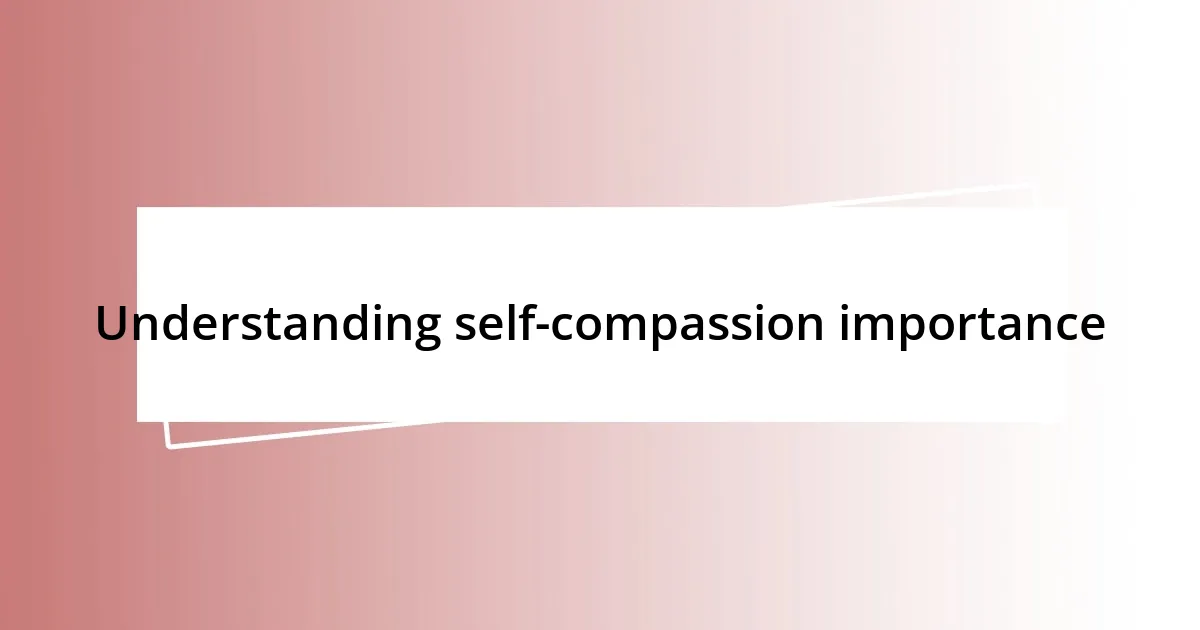
Understanding self-compassion importance
Self-compassion plays a pivotal role in our mental well-being. I remember a time when I was navigating a challenging period in my life, filled with self-doubt and unrelenting pressure. Instead of harshly criticizing myself for perceived failures, embracing self-compassion allowed me to acknowledge my struggles without judgment, creating a safe space for personal growth.
Have you ever noticed how we often extend kindness to our friends when they stumble, yet we forget to treat ourselves with that same tenderness? By practicing self-compassion, we cultivate resilience, enabling us to bounce back from setbacks with grace. This shift in perspective not only fosters a healthier relationship with ourselves but also encourages a more compassionate outlook towards others, as we learn to recognize our shared humanity.
Additionally, self-compassion directly impacts our emotional health. I’ve found that when I allow myself to feel pain without rushing to dismiss it or mask it with distractions, I can process my emotions more effectively. This deeper understanding of my feelings has led to a more authentic life, where I prioritize my well-being and acknowledge that it’s perfectly okay to not be okay sometimes. Isn’t it liberating to know that we all deserve gentleness, especially from ourselves?
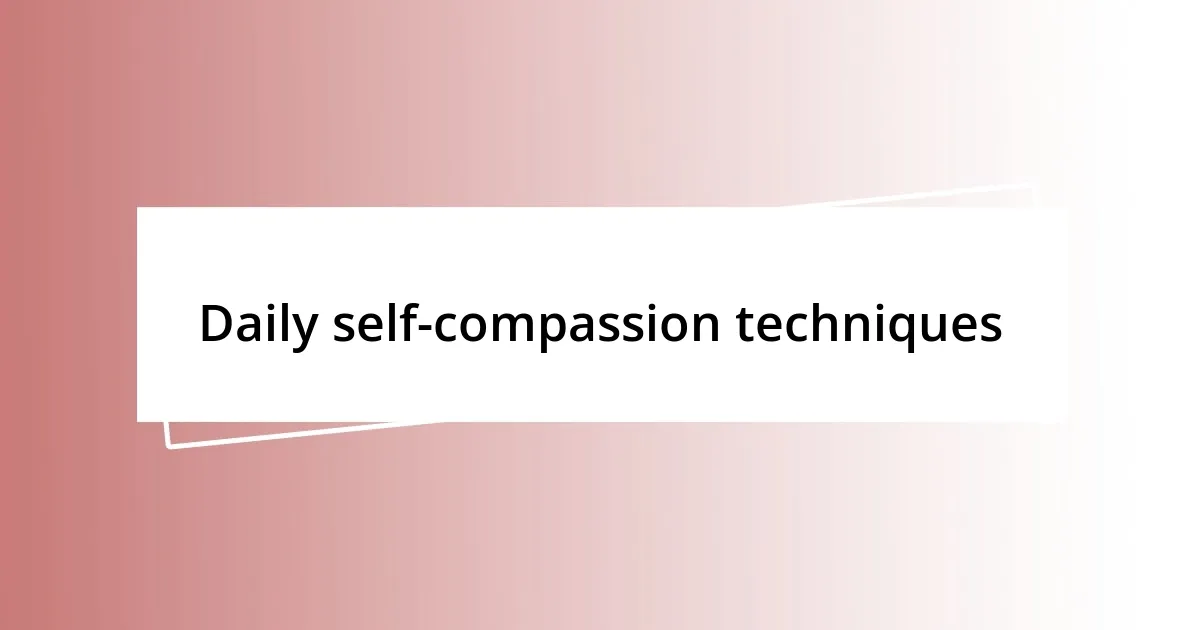
Daily self-compassion techniques
One of my favorite daily self-compassion techniques is embracing the art of gratitude. Each morning, I take a moment to jot down three things I’m grateful for, which shifts my focus away from self-criticism. It’s fascinating how expressing gratitude allows me to acknowledge my strengths while also recognizing my vulnerabilities. For instance, on a particularly tough day, instead of wallowing in my frustration, I wrote down my appreciation for my supportive friends and the lessons learned from my struggles. This simple practice serves as a gentle reminder that every experience, good or bad, contributes to my growth.
Here’s a list of effective self-compassion techniques that I find helpful:
- Mindful Breathing: When uncertainty creeps in, I pause to take deep breaths, grounding myself in the present moment.
- Self-Affirmations: I regularly tell myself phrases like “I am enough” and “It’s okay to feel this way,” reinforcing a positive internal dialogue.
- Forgiving Self-Talk: I replace harsh criticisms with kinder phrases, as if I’m speaking to a dear friend navigating a tough time.
- Setting Boundaries: I remind myself it’s okay to say no when needed, allowing space for self-care.
- Evening Reflection: Before bed, I reflect on my day, acknowledging both my victories and challenges without judgment, which helps me grow.
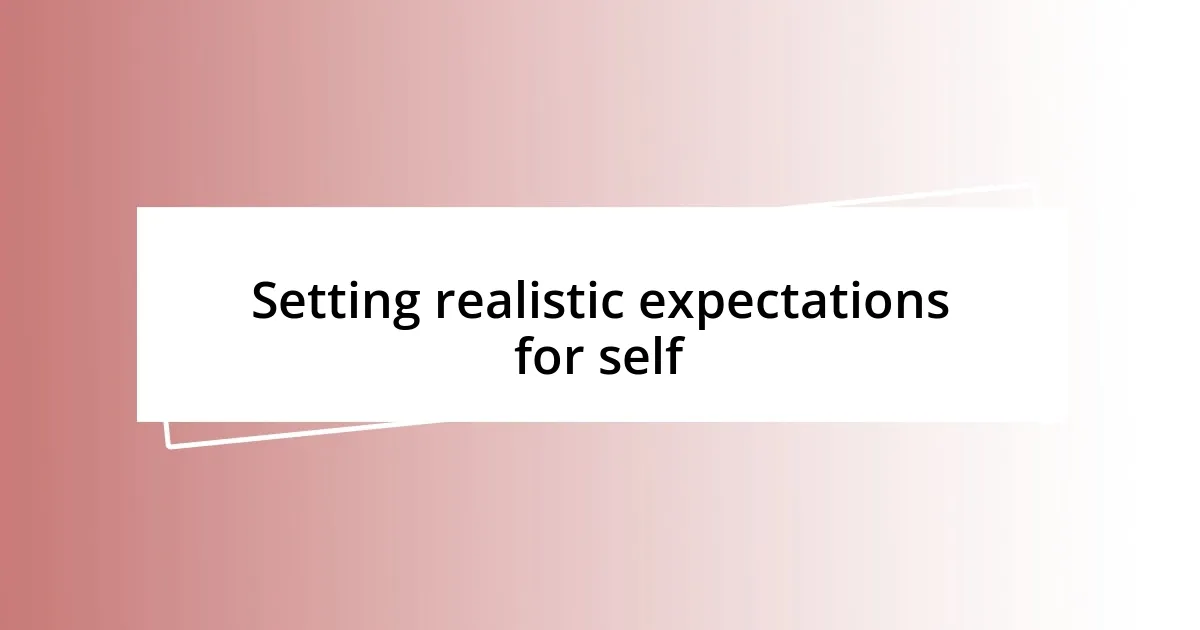
Setting realistic expectations for self
Setting realistic expectations for myself has been a transformative journey. I used to hold myself to unattainable standards, which led to constant disappointment. Now, I focus on creating achievable goals that feel right for me. For example, when I decided to incorporate regular exercise into my routine, I started small. Instead of aiming for an hour at the gym every day, I began with just fifteen minutes. This gradual approach helped me build confidence and enjoy the process, rather than feeling overwhelmed.
I’ve learned that setting realistic expectations goes hand-in-hand with understanding my limits. There are days when I simply don’t have the energy to tackle a lengthy to-do list. On those occasions, I reassess and prioritize what truly matters. Recently, I had a week full of commitments, and instead of pushing through, I chose to focus on one or two key tasks each day. This not only alleviated my stress but also allowed me to accomplish these tasks more effectively. I felt a sense of relief, knowing that it’s okay to adjust my expectations based on how I’m feeling.
Creating a balance in my life is essential, and it’s an ongoing practice. I often reflect on my achievements with kindness, reminding myself that every small step counts. When I embrace this mindset, I find joy in the progress I make, rather than dwelling on what’s left undone. I ask myself, “How can I be gentle with myself today?” This simple inquiry inspires me to set more compassionate and realistic expectations, leading to a healthier connection with myself each day.
| Unrealistic Expectations | Realistic Expectations |
|---|---|
| Overwhelm and stress | Manageable and achievable goals |
| Constant feelings of failure | Sense of accomplishment with small wins |
| Neglecting self-care | Prioritizing a balanced approach to tasks |
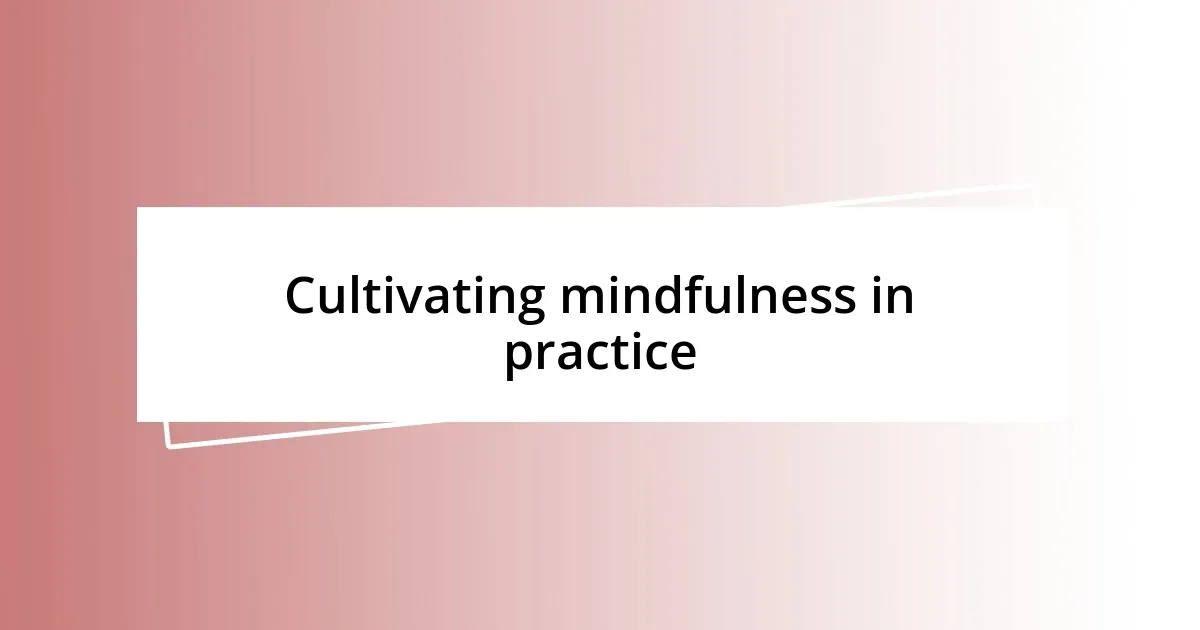
Cultivating mindfulness in practice
Cultivating mindfulness has become a cornerstone of my daily practice, bringing clarity and peace amidst life’s chaos. I remember a day when the world felt exceptionally heavy. Instead of rushing through my tasks, I slowed down to focus on each moment. I found myself fully engaged in simple activities, like savoring my morning coffee. That brief pause allowed me to appreciate the warmth of the mug and the rich aroma, grounding me before the day unfolded.
One technique that resonates with me is mindful walking. I started integrating short walks into my routine, deliberately paying attention to the sensations in my feet as they touched the ground. Initially, I was caught up in thoughts about my day’s agenda, but soon, I learned to redirect my focus to the rhythm of my breath and the sounds around me. It’s fascinating how this practice connected me to my surroundings in a palpable way, reminding me that being present can shift my entire mood. Have you ever experienced a moment where simply being aware of your environment lifted your spirits?
In moments of stress, I turn to body scans—a mindfulness practice that allows me to check in with myself. I lie down, close my eyes, and mentally scan my body from head to toe, noticing any tension or discomfort. One evening, after a particularly challenging week, I felt knots in my shoulders and tightness in my chest. By acknowledging these sensations without judgment, I found a way to release that pent-up energy. It’s incredible how this awareness not only alleviated my physical stress but also prompted a deeper sense of compassion towards my own struggles. Mindfulness truly allows us to engage with ourselves in a way that fosters love and understanding, doesn’t it?
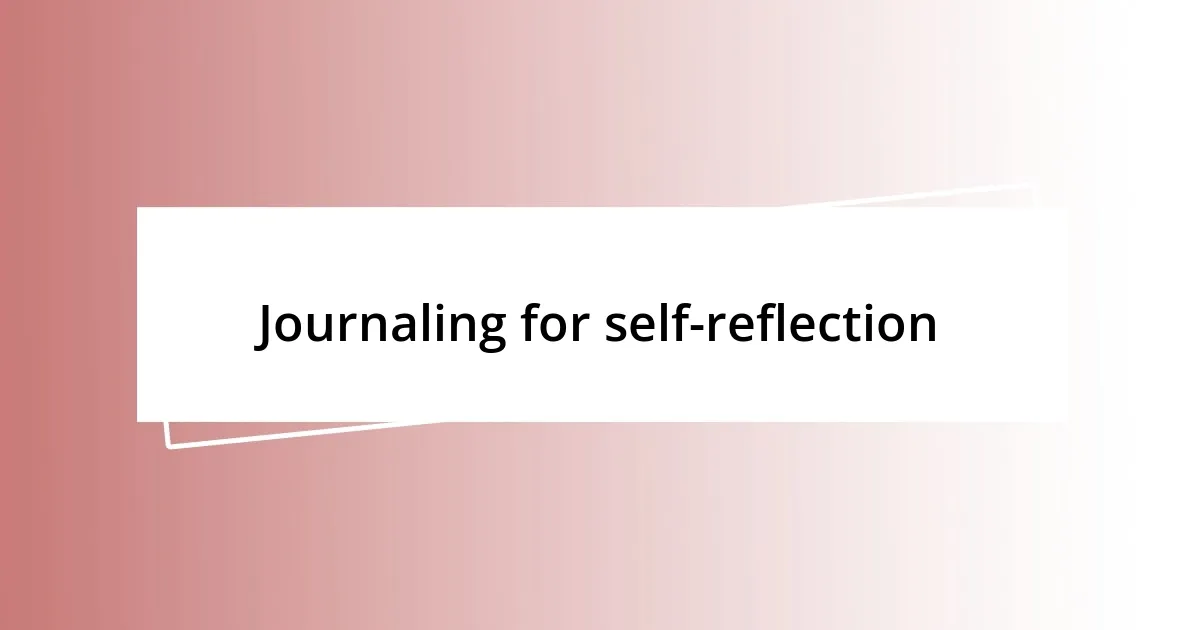
Journaling for self-reflection
Journaling for self-reflection has become my safe haven. There’s something magical about putting pen to paper that transforms my swirling thoughts into clarity. I often find myself writing about moments in my day that stirred strong emotions, whether joy, frustration, or even sadness. For instance, after a tough conversation with a friend, I sat down and let my feelings flow onto the page. It helped me untangle what I was really feeling and why, allowing me to process and move forward instead of letting it linger.
A pivotal aspect of my journaling practice is reflecting on my emotions without judgment. I remember one evening when I felt overwhelmed with self-doubt. Instead of pushing those feelings away, I wrote them down, examining each thought as though I were a keen observer. I asked myself, “What’s at the root of this doubt?” Diving deep into those questions opened my eyes to patterns I hadn’t noticed before, showing me that I’m often my own harshest critic. This realization cultivated a sense of compassion that I hadn’t tapped into prior.
Through journaling, I’ve learned to celebrate my wins, no matter how small. Just last week, I penned a victory when I decided to prioritize quiet time for myself amidst a busy schedule. This practice of self-reflection acts like a mirror, helping me recognize my growth over time. It’s fascinating how documenting these truths can empower us. Have you ever looked back on your journal and found strength in your past triumphs? For me, those moments remind me that I’m capable of more than I often give myself credit for.
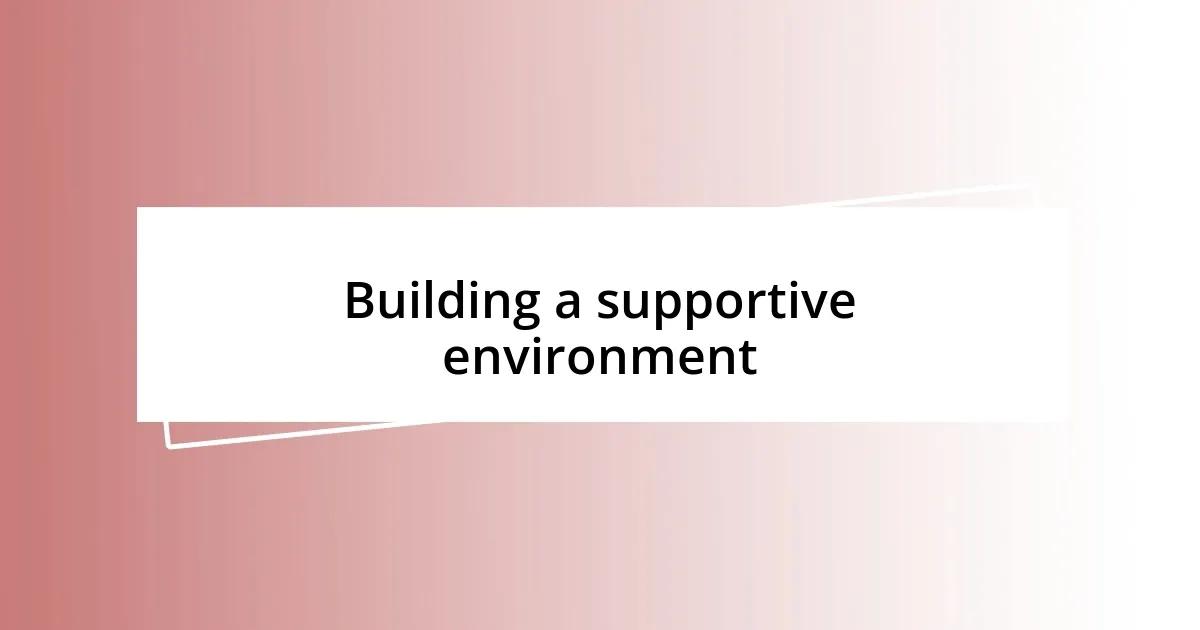
Building a supportive environment
Building a supportive environment is crucial for nurturing self-compassion. I’ve found that surrounding myself with positive influences makes a significant difference in my daily mindset. For example, I’ve intentionally chosen to spend more time with friends who uplift and inspire me, rather than those who drain my energy. Isn’t it amazing how company can impact your thoughts? This shift has led me to feel more hopeful and encouraged to be gentle with myself.
Creating a supportive physical space has also been vital. I remember when I reorganized my living area to eliminate clutter and introduce more comforting elements like soft lighting and plants. This simple change transformed my environment into a haven where I could unwind and practice self-compassion. What aspects of your space could be improved to promote a more supportive atmosphere? For me, even the color of my walls can influence my mood, reminding me to be mindful of my surroundings.
Additionally, I’ve learned the importance of setting boundaries to protect my emotional well-being. There was a time when I felt obligated to attend every social event, leaving little room for self-care. By saying “no” more often, I began carving out precious time for reflection and nurturing my mindset. Have you ever felt overwhelmed by trying to please everyone? Embracing boundaries allowed me to breathe and cultivate a deeper sense of self-compassion without external pressures weighing me down.
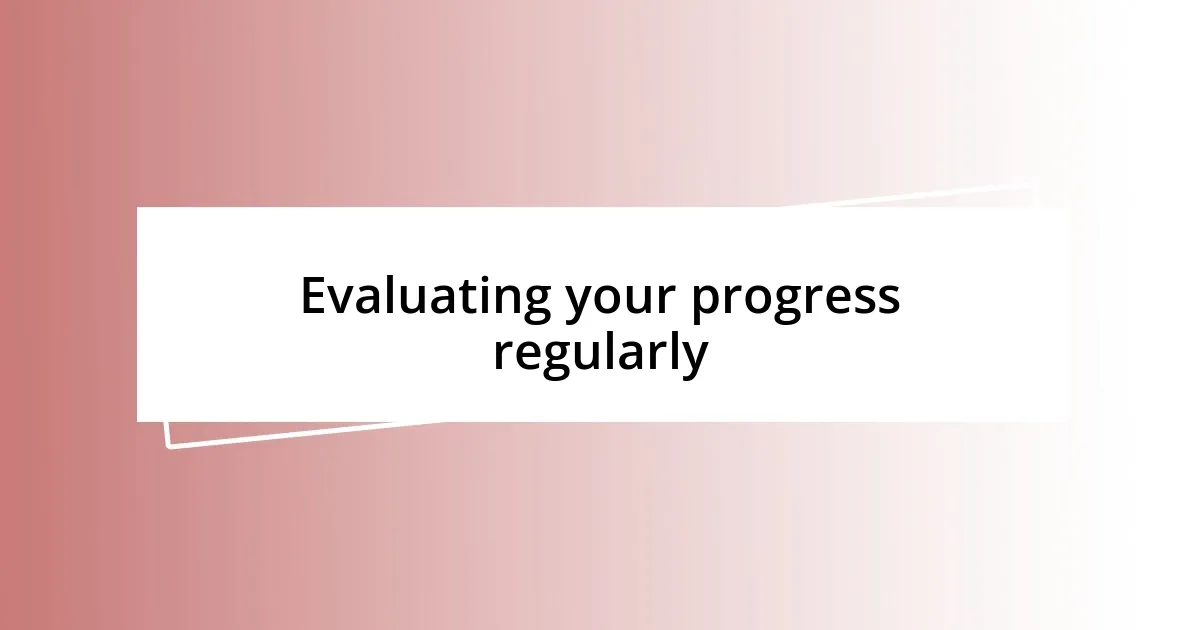
Evaluating your progress regularly
Regularly evaluating my progress in self-compassion has been a game changer for me. I’ve made it a point to check-in with myself at the end of each week, assessing how I’ve treated myself in moments of struggle. Just last Sunday, as I reflected on a challenging week, I noticed that I had been kinder to myself during a tough work project. Recognizing this growth felt incredibly validating and spurred me on to continue my practice.
When I evaluate my progress, I also look for patterns that may reveal areas for improvement. For instance, I discovered that I tended to slip back into self-criticism in the mornings. A couple of months ago, I started writing affirmations each day, focusing on self-kindness. By assessing my feelings around this habit, I noticed I felt more grounded and less rushed throughout my mornings. Are there specific times when you find yourself being more critical? Identifying those moments can be a powerful step towards cultivating gentler self-talk.
Another strategy I’ve embraced is setting measurable goals for my self-compassion practice. At the start of each month, I establish small, achievable objectives—like dedicating one evening to self-care or trying mindfulness meditation. When I revisit these goals, I’m often surprised by the impact they’ve had on my overall well-being. For example, one month, I aimed to reduce negative self-talk and replaced those moments with kindness. Looking back, I could see tangible improvements in my mindset. What small changes could you commit to that might open the door to greater self-compassion in your life? Engaging in this ongoing evaluation not only highlights my growth but also fuels my journey toward a more compassionate self.












